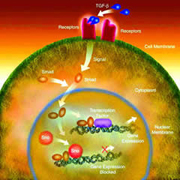


[Science Matters] In cancer, the protein known as TGF-beta is both a blessing and a curse. Among cells just beginning to turn malignant, it acts as a tumor suppressor, inhibiting their growth. But among later stage cancers, this protein that also regulates wound healing and cellular growth becomes a tumor promoter that provokes metastasis. How can a single-molecule trigger exert such contradictory effects? In fact, genes with such dual roles in cancer may be the rule rather than the exception. “When you inhibit a tumor suppressor, you encourage cancer,” explains Berkeley Lab life scientist Kunxin Luo, “That poses a challenge for treatment.” More>
 André Anders of the Accelerator and Fusion Research Division has won the 2010 Merit Award from the IEEE Nuclear and Plasma Sciences Society (NPSS), whose current newsletter (page 18) outlines his intriguing life and career. The award includes a certificate, plaque, and $5,000. In notifying Anders, NPSS chairman William Moses of the Lab’s Life Sciences Division added a personal note: “There are many talented people in the NPSS and very few are chosen to receive one of these awards ... this is an accomplishment that you can be very proud of.”
André Anders of the Accelerator and Fusion Research Division has won the 2010 Merit Award from the IEEE Nuclear and Plasma Sciences Society (NPSS), whose current newsletter (page 18) outlines his intriguing life and career. The award includes a certificate, plaque, and $5,000. In notifying Anders, NPSS chairman William Moses of the Lab’s Life Sciences Division added a personal note: “There are many talented people in the NPSS and very few are chosen to receive one of these awards ... this is an accomplishment that you can be very proud of.”
[San Francisco Chronicle] Ervin Hulet, a pioneering nuclear chemist at what are now Lawrence Berkeley and Livermore Labs, died June 29 at his home. Working with famed chemist Albert Ghiorso at the Berkeley lab's SuperHILAC, Hulet co-discovered element 106 and named it Seaborgium after Glenn Seaborg, whose team had recruited him to join them in researching new elements. More>
 Employee Development: Class on Improving Meeting Facilitation Skills
Employee Development: Class on Improving Meeting Facilitation Skills Finding it a challenge to facilitate meetings? On Thursday, July 15, from 1 to 2 p.m., the Berkeley Lab Learning Institute will offer a one-hour webinar that can help. The class, Conducting Effective Meetings (BLI0131), will provide useful tips for planning meetings, handling challenging participants, and keeping discussion on track. The workshop instructor is a leadership development consultant and coach with 25 years of experience. Content is relevant for all employees, and you’ll participate from the convenience of your own desk. Registration is required.
 Motor vehicle drivers and bicyclists are reminded to obey all California vehicle codes when traversing the roadways at the Lab. The UC Police Department will continue to conduct traffic patrols at the Lab in an effort to improve safety. Those who violate the code will be cited. The patrols, which started a few months ago, have helped reduce incidents involving cars, bicycles and pedestrians. In addition to speeding and running stop signs, tickets will be issued to cars that are parked in motorcycle spaces, red zones, and handicap spaces without authorization, or are blocking fire hydrants or other vehicles (except in stacked parking lots).
Motor vehicle drivers and bicyclists are reminded to obey all California vehicle codes when traversing the roadways at the Lab. The UC Police Department will continue to conduct traffic patrols at the Lab in an effort to improve safety. Those who violate the code will be cited. The patrols, which started a few months ago, have helped reduce incidents involving cars, bicycles and pedestrians. In addition to speeding and running stop signs, tickets will be issued to cars that are parked in motorcycle spaces, red zones, and handicap spaces without authorization, or are blocking fire hydrants or other vehicles (except in stacked parking lots).
The Lab’s Health Care Facilitator wants to remind employees that warmer temperatures attract mosquitoes, ticks, fleas, and other insects that can transmit West Nile virus, Lyme disease, and other illnesses. The proper use of insect repellent allows you to remain outdoors with a reduced risk of bites. Once inside, check your body, clothing, children, and pets for ticks. If you become ill one to three weeks following a tick bite, be sure to inform your doctor, as it could be any number of illnesses.
Today
at Berkeley Lab encourages feedback and story ideas
Deadline for submissions is 10 a.m. two days prior to publication
TABL is produced by Public Affairs' Communications Group